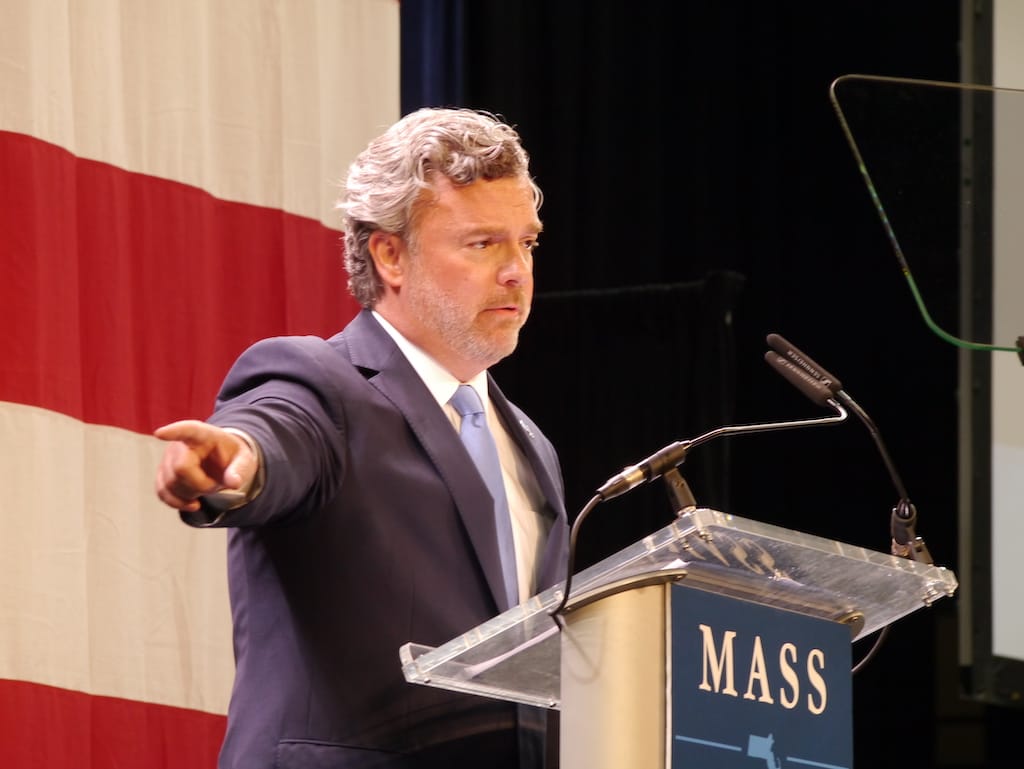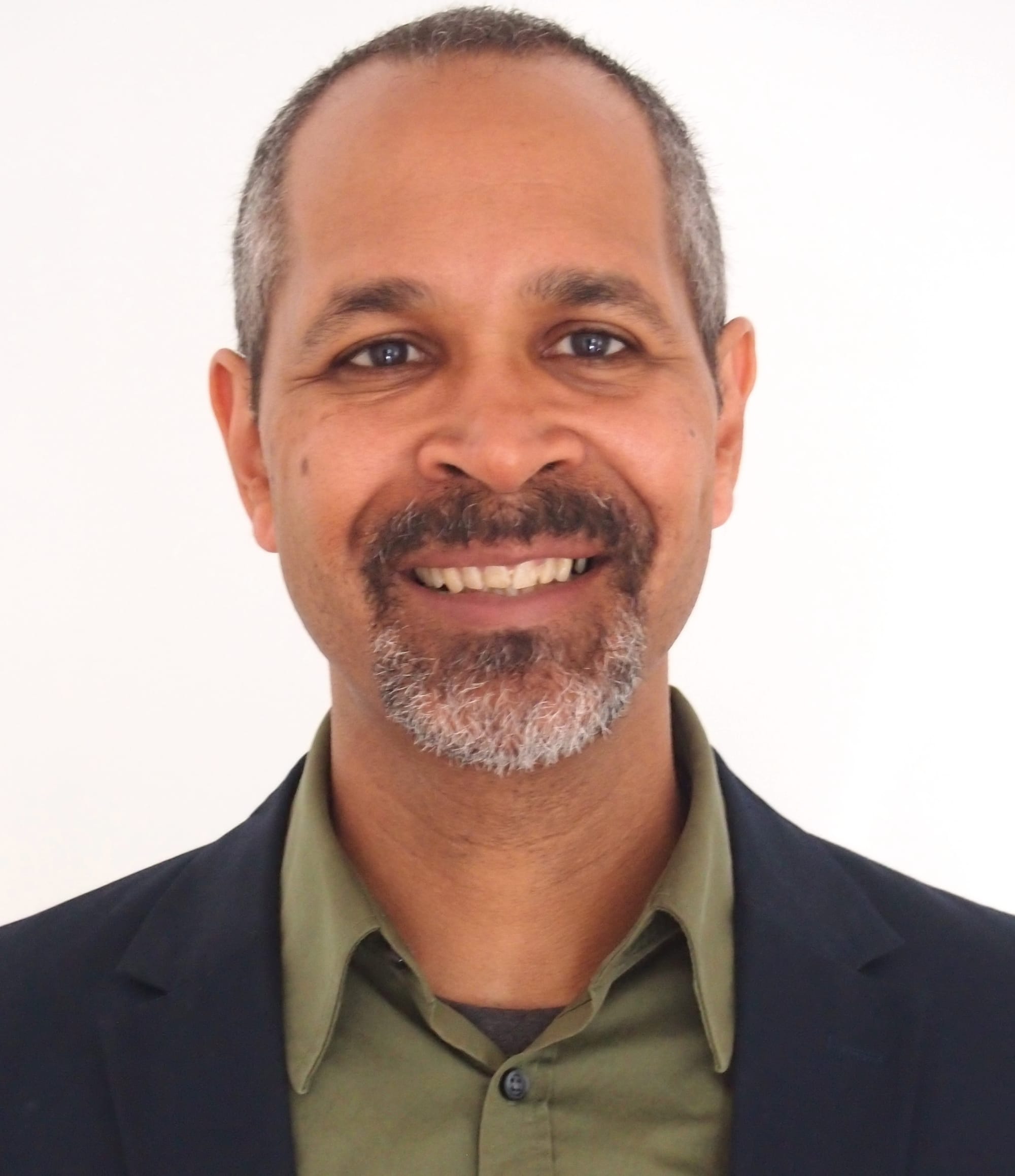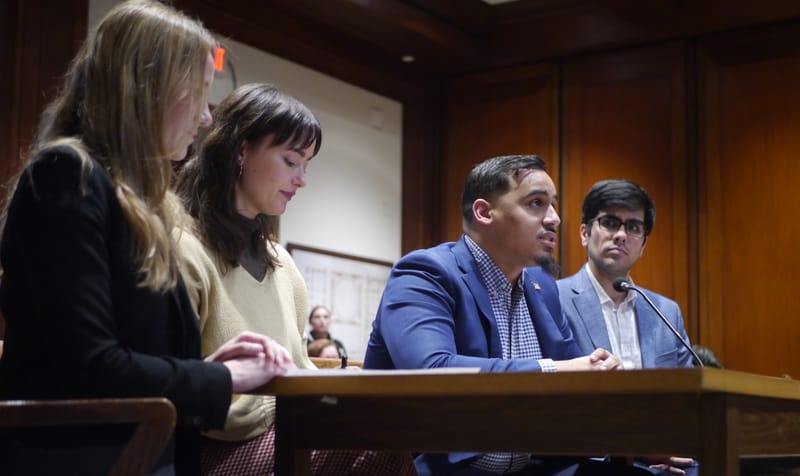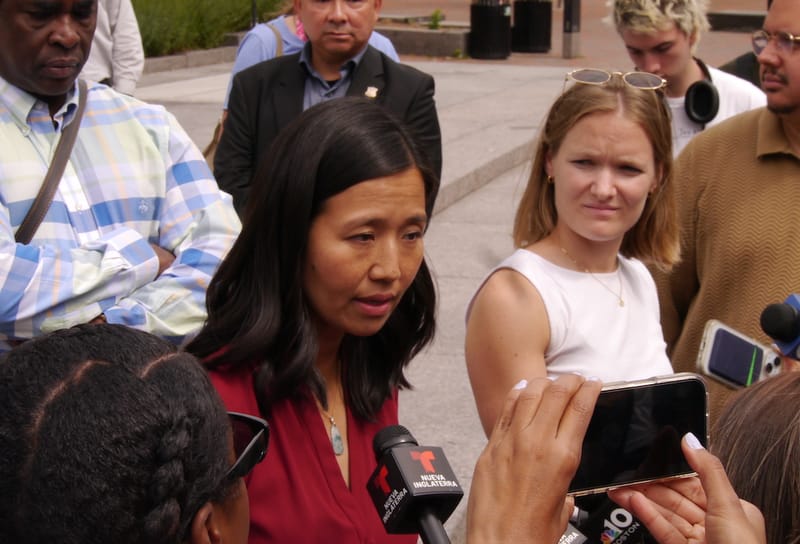Can Massachusetts chart a path for the Democratic Party?
Saturday’s convention highlighted the difficulty local and national Democratic party leaders have had in offering a vision that distinguishes their party from that of the Republicans.
With no legislative or constitutional offices on the ballot, state Democratic Party conventions are usually low-stakes affairs during which state delegates debate a party platform to which legislative leaders and top elected officials usually pay little heed.
So the 40-or-so minutes of battling in which delegates and party officials engaged on the floor at Springfield’s Mass Mutual Center Saturday was a break from tradition. At issue were a slew of planks in the party platform progressives had won over recent decades, including commitments to fight for single-payer health care, to support progressive taxation, to prevent local police from cooperating with federal immigration officials on civil immigration enforcement, to support voting reforms such as same-day registration and instant runoff voting.
The draft 2025 platform — released in advance of the convention — appeared to jettison those issues and cleave to a more centrist agenda, a move that angered grassroots party activists.
“Mass Democrats should have a bold vision for the state and really lead Democrats nationally,” said state Sen. Jamie Eldrige, interviewed on the floor of the convention center. “My concerns are — despite some well-intentioned efforts by the platform committee — that this draft removes pieces around labor rights, supporting immigrants, around racial justice, around making healthcare a right. And those are exactly the kind of positions we need to take to not only advance policies to help all Massachusetts residents, but to distinguish us from other parties, for unenrolled voters to understand what the party actually stands for.”
Saturday’s episode highlighted the difficulty local and national Democratic party leaders have had in offering a vision that distinguishes their party from that of the Republicans. While Donald Trump’s 2024 victory highlighted the problem, with diminished Democratic turnout in Massachusetts and across the country boosting the Republican’s electoral fortunes, there has been no broad consensus on a path forward for the party.
At the convention, Eldrige and other progressive Democrats pushed for and won a resolution to revert back to the 2021 platform, keeping intact the progressive planks from prior years. It took some doing.
Speaking from the stage Saturday, party Chairman Steve Kerrigan informed the progressives that their resolution to keep the 2021 platform could not move forward. Although proponents had secured the requisite number of signatures, they had failed to distribute written copies of their resolution to convention attendees.
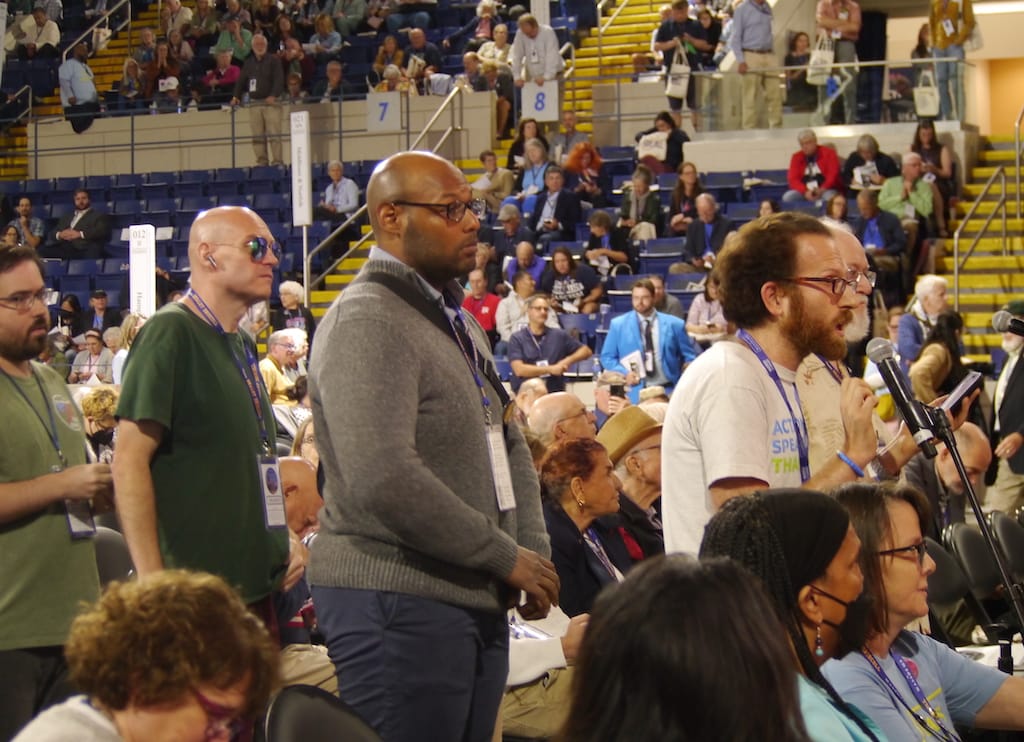
Speaking from the floor, progressive activists countered that proponents of other resolutions being heard had also failed to distribute written copies. Kerrigan was repeatedly booed as he refused to budge on the progressives’ resolution and was interrupted by activists chanting “Let us vote.”
At last, one delegate advanced a resolution from the floor to waive the requirement that delegates receive written copies of amendments. The motion was seconded and passed by voice vote. The resolution restoring the 2021 platform then passed.
Democrats’ vision
In a Boston Globe op-ed published last Wednesday former Labor Secretary Robert Reich argued Democrats should embrace the populist progressive vision for the party espoused by the likes of New York City mayoral candidate Zohran Mamdani, rather than moving to an imaginary center between their own party’s ideals and the far-right extremism of the Republican Party.
“If it’s to have a future, the Democratic Party must not only condemn Trumpism but explain why so many Americans are struggling and offer a credible path for most people to share in the nation’s prosperity,” Reich wrote.
While Reich argues for the party to lean in on progressive values, Mass Dems party insiders seem to be trying a different tack. In her address to the convention delegates, Newton Democrat and Platform Committee Chair Martina Jackson suggested the party take a more defensive stance.
“Let’s be honest: The losses we faced in 2024, especially in communities that have long been Democratic strongholds, compelled us to take a hard look at how we communicate our values,” she said.
Jackson’s address echoed the sentiments of some Democratic Party leaders who believe that Democrats’ past embrace of social justice issues such as transgender rights, diversity, equity and inclusion and criminal justice reform alienated white male voters.
“We heard one message, again and again, throughout this commonwealth — we need a platform that focuses more on working people,” Jackson said. “On opportunities for working people, on training on job security and on living wages.”
Yet, critics pointed out, the platform removed policy commitments that would help the working class, such as ending worker misclassification.
Some Democratic activists argue that Trump’s victory in the 2024 election was more a function of disaffection among Democrat-leaning voters than of a surge in Republican voters. Issues such as U.S. support for Israel’s invasion of Gaza have whittled away at the party’s base, says Boston Ward 12 Democrat Louis Elisa.
“The fact that we’ve been silent on the genocide in Gaza leaves me wondering where we’re going as a party,” he said. “This is our time. If we don’t pull it together, we lose many people who are committed to human rights.”
Outside the conventional hall, activists with groups such as Jewish Voice for Peace urged delegates to press the party to take a stand against Israel’s war. Inside the hall, dozens of delegates sported Palestinian kuffiyehs and displayed other tokens of support for Palestinians. U.S. Sen. Ed Markey was the only speaker on the stage who mentioned the war.
A Democratic state
In Massachusetts, where Democrats have for decades had an iron grip supermajority on the House and Senate and where the current governor, the entire congressional delegation and all constitutional officers are Democrats, the party’s struggle to embrace progressive planks in its platform Saturday left many frustrated.
“We have Democratic control here in Massachusetts, we can show the whole country how to fight forward, how we use Democratic control to advance an aggressive, working-class agenda,” said Massachusetts AFL-CIO President Chrissy Lynch, speaking in the lobby outside the convention floor. “We want responsible revenue, policies that don't provide a runway for the federal cuts, that actually show a different way here, where those who can most afford to pay, like big, multinational corporations do and invest in the public services that all of us need.”
Lynch’s union and others backed the years-long battle to institute the Fair Share Amendment, a ballot initiative that placed a 4% surtax on annual income above $1 million. While that amendment, which took effect in 2023, has added $2.2 billion in additional revenue to the state’s $60 billion budget, Gov. Maura Healey and the Legislature in 2023 signed into law $1 billion in tax cuts, including cuts to short-term capital gains taxes, estate taxes and a cut in taxes on businesses operating in both in Massachusetts and in other states.
“Labor won the Fair Share Amendment,” said Mass Teachers Association President Max Page. “The Democratic Party should be celebrating that, but the governor undermined it pretty much right away.”
In the face of legislative inaction on key issues, unions have been pushing a progressive agenda via ballot initiatives. The Fair Share Amendment, the petition to end the use of the MCAS exam as a graduation requirement and the current petition to institute rent control statewide have all had the backing of the MTA and other unions. The bold leadership party activists are seeking are coming from outside the State House.
What matters most, Lynch says, is not what’s in the platform. It’s what actually gets done on Beacon Hill.
“However, the platform ends up, whether it’s a values statement or whether it’s a long list, if there’s no action, it’s just words on paper,” she said. “And working-class people want action on working-class issues. We want to see Democrats prioritizing creating an economy that actually works for the working class, because it’s been broken for a long time.”
The platform has always served as a sort of aspirational document that highlights the gap between the progressivism of the party’s base and the often centrist impulses of legislative leadership and Democratic governors. But what does it mean when the party abandons its progressive aspirations?
“They had a listening tour. Everybody said the party needs to speak up,” said Annie Rousseau, chair of Boston’s Ward 11 Democratic Committee and a co-chair of the group, JP Progressives. “Instead, they’ve just regressed. We’re in a constitutional crisis. I expect our party to stand up for democracy.”


